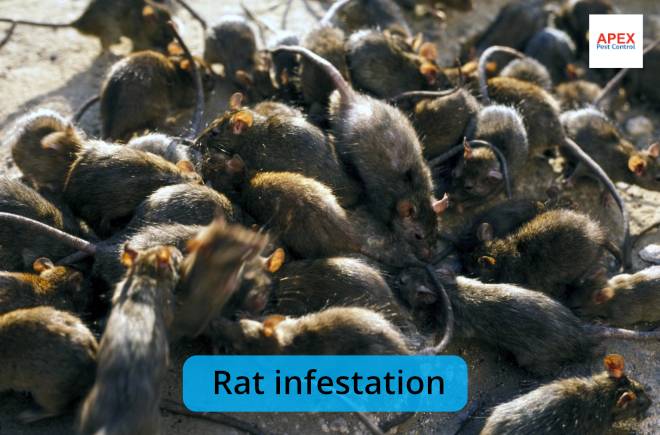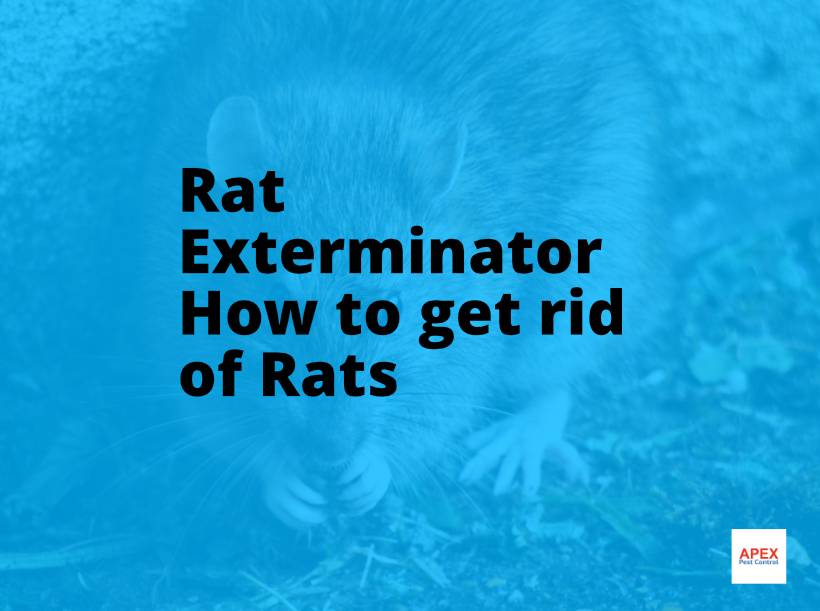Rat Exterminator: How to Get Rid of a Rat Infestation
Rats are nocturnal pests and show up often during the late Summer or when the Autumn season approaches.
Rat infestation in the UK is not news; however, getting rid of rats is painful. Moreover, the sole thought of rats nesting in your home, gnawing at edibles and creating a mess is unsettling.
Not to forget, deadly diseases such as leptospirosis (Weil’s disease). Spread by rats resulting in an unhygienic environment is agitating for people living in any building, be it a home or business.
This calls for an immediate professional rat control service.
People who have kids or pets at home are more concerned about having pest infestations and naturally so.
These creepy crawlers possess two dangerous threats:
- To contaminate the edible items in your home; and
- Damage your property structure.
The problem turns bigger when DIY methods fail to work, and infestation grows, resulting in more chaos and the threat of diseases. It is therefore integral to get rid of rats as soon as possible and breathe a sigh of relief.
If you’re already finding yourself in a dire strait, wait no longer and immediately call us now: 0114 3491098. Rat exterminators at Apex Pest Control are veterans in removing rat infestations. They will take measures to ensure rats don’t re-infest.
If you want more information on rat infestation, read on. In this blog, we are going to learn signs of rat in the house, when should you call for rat removal services and the cost of the same.
So let’s begin with the commitment to eradicating rat infestation!
The Common, Brown or Norway Rat, also known as the sewer rat, and are prevalent across the whole of the UK.
When should you call an exterminator for rats?
Trapping a few rats after spotting them, occasionally, may sound victorious. However, that is only the tip of the iceberg. There may be an entire family of the rat that’s hidden in nests or burrows.
Poisoning does no good either since rat corpses cause unbearable odour and will be harder to track.
Hence, it’s bothersome to think there may be more than one residing in your home, sneaking in the kitchen and leaving the countertops unhygienic with their greasy bodies.
Therefore, here are two situations when you must call for a rat exterminator:
- Upon observing signs: When you notice signs of a rat infestation in your home (more on this further in the article), you should immediately call a rat exterminator.
- Upon discovering nest/den: When you have spotted the exact location of the infestation, this could be a nest or a burrow. After this point, you must not wait further to call in a professional and treat the infestation.
For the most serious cases wherein the property has already suffered extensive damage to various key areas, a more complex rat control treatment is required. Properties with large attic and basement areas most likely fall into this category. (peststrategies.com)
Now let’s explore some signs of a rat infestation in your house or office.
Black rats adapt to a wide range of habitats. In urban areas, they are found around warehouses, residential buildings, and other human settlements.
en.wikipedia.org/wiki/Black_rat
Signs of rat infestation

By now, you would have gotten an idea of threats possessed by rats. Watch out for these signs that demand calling control services.
- Gnaw marks: Rats are found in two categories, primarily: black rat and brown rat. Black rats are agile, can climb quickly, and hence they are often found in attics. Therefore, gnawing marks on belongings in the attic, such as cables and wires, are a hard-to-neglect sign of an infestation.
- Rattling noise: Another apparent sign of an infestation is to inspect when you hear a rattling or scratching sound. Rats create noise with their teeth while biting any substance.
- Rat droppings: When you notice dark brown, usually tapered droppings, resembling the grain of rice, you know the brown rat is the culprit.
- Rat holes: Rodents create burrows where they can nest, shelter, and store food. Burrows get found near stable structures.
- Rat nest: Any warm place with easy access to food is a comfortable home for rats. Therefore, look in your attic, under eaves and wall cavities. Rats create nests with cardboard and other soft materials.
- Footprints: locked in less used spaces in your home where there’s usually a collection of dust. It’s easier to spot footprints there and identify an infestation.
Now that you are aware of what signs to look at, let’s look at some places you should watch out to catch the culprit’s nets or den.
Aside from the health risks, the sound of them scuttling around the home, the evidence of their presence and the damage they can cause do little to help householders sleep easy. (bpca.org.uk)
Well-known places of rat infestation:
- Compost bin: Rats hide in the compost bin because of easy access to food and shelter. To identify an infestation, look for gnaw marks on the top or side of the container.
- Overgrown garden: Vegetation makes a comfortable shelter for rats, hence, watch out for holes near trees, shrub roots or abandoned wastelands.
- Decking: look for holes or scratch marks on the edge of decking for signs of infestation or rat home.
- Garage: these are another potential entry or hiding spot for creepy crawlers. Hence, look out for the gnaw marks on the wooden doors, or other entry points.
- Drains: holes or bite marks on drain covers give a signal of infestation
- Sheds: usually found outside the home, look for rat holes or entry points.
- Loft: if you have not stepped in your attic for a long time and the place is cluttered, rats will find their home because of access to building material. Hence, look for rat droppings or chewed items in the loft.
- Kitchen: undoubtedly, one of the most common places for rats to run around, is the kitchen. Look behind the cookware or dishwasher.
- Laundries: look behind the washing machine or gap behind pipes.
Can you just have one rat in your house?
No, it is very unlikely there will be one rat in your home or property. Rats are very social, the bread very quickly therefore it is unlikely there will be only one rat in your home.
(rentokil.co.uk)
How do exterminators get rid of rats?
Now we have a clear idea of how to identify the infestation and the places to look for. Let us walk you through the steps we take to make sure we remove the rat from your home and seal the entry points as well.
Step 1
It’s always integral to first inspect the potential entry points for the rat. We do this by examining the interior and exteriors. We look for the signs mentioned above – rat droppings, marks or bitting and the damage done to the property.
Step 2
Marking the entry point: after affirming the infestation, we look for entry points. These points could be drains, drainpipes, sewer, and air vents. Then, we block these points to prevent further intervention of the rats.
Step 3
Rattrap or bait station: We have several methods to catch the rats, which include setting rodenticide bait in tamperproof bait stations. After discussing it with you and agreeing to it, we set the trap. Based on how severe the infestation is, and keeping in mind the safety of your family, we set the trap.
Step 4
We don’t leave at just that! Our staff takes a follow up after 5-7 days of the first visit to inspect the building and remove the corpse of the rat.
For protection against accidental poisoning, use tamper-resistant bait stations that hold the baits in place and keep children and pets out.
How to prevent rat intervention?
- Don’t overfeed the birds: if you feed the birds, then make sure to place a proper table or feeder basket to prevent uninvited rodents. Many people take the basket or feeder indoors at night to avoid attracting rats.
- Keep bins clean: ensure cleaning the containers after emptying. Another essential step to take is to cover any bin to prevent entry and nesting of rats.
- Seal potential entry points: spaces near the pipes and windows are possible entry points for rats. Other places you should look for are near under the shed. Make sure to prove these points to prevent the entry of rats.
- Avoid potential nesting points: any place where rats can hide and get access to food should get eradicated. These include overgrown areas in the garden and even compost heaps. Furthermore, look out for clutter in your attic because rats can nest in places like piles of wood and more such material they can bite on.
Think about entry points. Even small gaps create easy access for rats which can squeeze through a space as thin as two fingers. (bpca.org.uk)
How much does an exterminator cost to get rid of rats?
On average, the cost of the rat extermination is £110. This includes all of the steps mentioned above — from examining the property to set up traps, bait stations and follow up visit.
Moreover, if the infestation requires additional visits and further control services, the cost will be £35.
Reach out to us to get exact quotes depending on the area of your home, place, and size of infestation and more.
How to get rid of rats?
Now that we are aware of how these rodents as creepy crawlers are a threat to your property and family, let’s take some action to get rid of rats from your house. Get in touch with us to get professional rat eradication in your home or business building.
With our guaranteed services to remove the rats in the house, you can safeguard your property and protect the health of your family and pet.
We are a team of confident pest controllers offering a guaranteed rat control service to ensure getting rid of rats and preventing reinfestation.
We take care of complete problems, including infestation, rat control treatment, extermination and lastly, rat proofing.
Moreover, we are NPTA certified and work all seven days of the week.
So opt for a safe option to eradicate rat infestation in your house!
So if you have rats, Call us at Apex Pest Control today: 0114 3491098 and enjoy a pest-free house.

Tony Johnson, Founder & Lead Technician at Apex Pest Control, is a BPCA and NPTA accredited pest management expert with over 35 years’ hands-on experience. Tony specialises in Integrated Pest Management and ensures all services comply with UK pest legislation, including the Wildlife and Countryside Act 1981 and COSHH Regulations 2002. His commitment to continual learning and adapting to industry best practices means clients receive effective, safe solutions for pests affecting homes and businesses across South Yorkshire. Tony’s dedication to professional standards, ethical treatment methods, and local expertise has made him a trusted partner for pest control and prevention.
-
BPCA & NPTA accredited | CHAS certified
-
Committed to UK pest law compliance & safety
-
Focused on effective, ethical pest management for South Yorkshire


